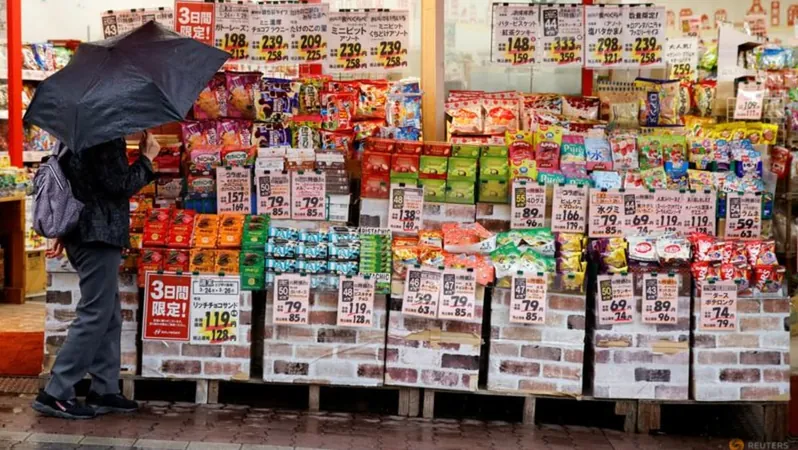
Japan's Wholesale Inflation Cools: Is the BOJ Off the Hook?
2025-06-11
Author: Sarah
In a surprising twist on Japan's economic landscape, wholesale inflation has decelerated, sparking intrigue about potential interest rate shifts by the Bank of Japan (BOJ). According to recent data released, rising import costs for raw materials have eased, alleviating some pressure on the central bank to act.
While overall wholesale price growth moderated, the food and beverage sectors saw prices climb, indicating that companies are still passing along rising costs despite global uncertainties and lukewarm consumer spending. The corporate goods price index (CGPI) revealed a 3.2% increase in May compared to a year prior, significantly lower than the anticipated 3.5% gain and marking the most modest rise since last September.
Senior economist Masato Koike from Sompo Institute Plus suggests this cooling inflation trend could eventually translate into lower consumer prices. He warned, however, that the BOJ may miss its window to raise interest rates if inflation moderates before clarity emerges from ongoing tariff negotiations between Japan and the U.S.
Reflecting the shifts in various sectors, prices for steel goods dropped by 4.8%, while chemical products fell 3.1%. Even non-ferrous metals saw a 2.1% decline. Conversely, food and beverage prices climbed by 4.2%, an acceleration from the previous month's 4% rise, highlighting persistent inflationary pressures in these areas.
Japan’s economic outlook remains clouded due to the ongoing tariff talks with Washington, which has already prompted the BOJ to readjust its growth forecasts. This uncertainty casts doubt on the timing of any future rate hikes, even as overall inflation steadily rises.
In April, core consumer inflation hit 3.5%, the highest in over two years, consistently overshooting the BOJ's 2% target primarily due to soaring food prices. Although the BOJ anticipates a slowdown in food inflation, they stand ready to raise rates as soon as the economy shows signs of robust recovery bolstered by solid wage increases.
Following the conclusion of a decade-long stimulus program last year and a January interest rate hike to 0.5%, the bank is entering cautious territory. According to a recent Reuters poll, most economists expect the BOJ to maintain steady rates through September, but a slight majority predict a potential rate increase before the year wraps up.
As Japan navigates through these complex economic challenges, the financial world watches closely, questioning: Will the BOJ act, or will it wait for clearer skies?




 Brasil (PT)
Brasil (PT)
 Canada (EN)
Canada (EN)
 Chile (ES)
Chile (ES)
 Česko (CS)
Česko (CS)
 대한민국 (KO)
대한민국 (KO)
 España (ES)
España (ES)
 France (FR)
France (FR)
 Hong Kong (EN)
Hong Kong (EN)
 Italia (IT)
Italia (IT)
 日本 (JA)
日本 (JA)
 Magyarország (HU)
Magyarország (HU)
 Norge (NO)
Norge (NO)
 Polska (PL)
Polska (PL)
 Schweiz (DE)
Schweiz (DE)
 Singapore (EN)
Singapore (EN)
 Sverige (SV)
Sverige (SV)
 Suomi (FI)
Suomi (FI)
 Türkiye (TR)
Türkiye (TR)
 الإمارات العربية المتحدة (AR)
الإمارات العربية المتحدة (AR)